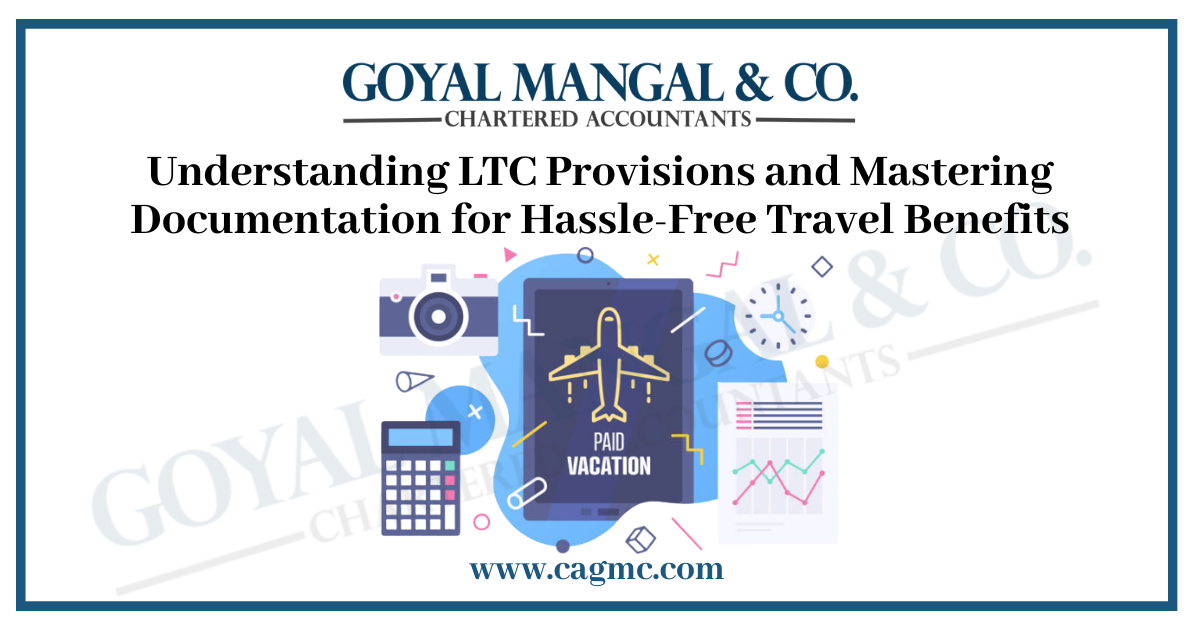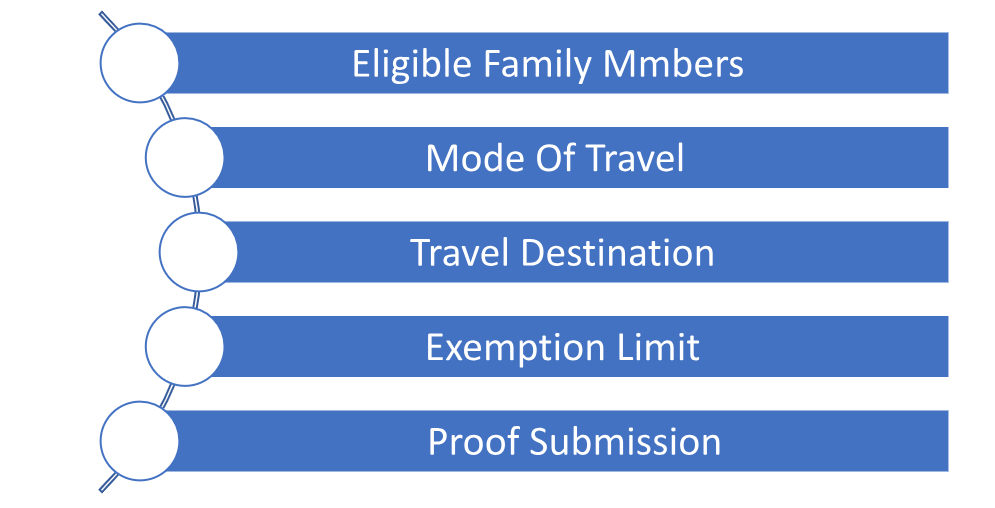 In the hustle and bustle of our daily lives, taking a break to unwind and recharge has become more important than ever. Recognizing the significance of work-life balance, many companies offer Leave Travel Concession (LTC) as a part of their employees’ compensation packages. Leave Travel Allowance not only supports employees’ travel aspirations but also comes with tax benefits and promotes holistic well-being. In this blog, we’ll delve into the world of LTA, exploring its benefits, rules, and how it contributes to a healthier work-life equation.
In the hustle and bustle of our daily lives, taking a break to unwind and recharge has become more important than ever. Recognizing the significance of work-life balance, many companies offer Leave Travel Concession (LTC) as a part of their employees’ compensation packages. Leave Travel Allowance not only supports employees’ travel aspirations but also comes with tax benefits and promotes holistic well-being. In this blog, we’ll delve into the world of LTA, exploring its benefits, rules, and how it contributes to a healthier work-life equation.
Define Leave Travel Concession
Leave Travel Concession (LTC) also known as Leave Travel Allowance is a tax benefit provided by the Indian government for travel expenses to salaried individuals. This benefit encourages employees to take family vacations and explore different regions of the country. Depending on their employer’s policies and tax regulations, LTC primarily applies to government employees, employees of public sector companies, and certain private sector employees.
The eligibility for LTC is contingent on the employee’s grade or designation. The travel fare is restricted to economy-class airfare for the shortest route, train fare, or a certain ship/bus class. LTC can be claimed for travel by air, rail, and public transportation such as buses. For air travel, the claim is limited to economy class reservations unless the employer specifies otherwise.
The LTC claim may be utilized for travel to various regions of India, contingent on the employee’s home location and the employer-specified rules. Employees are responsible for incurring travel expenses and retaining essential documentation, such as tickets, boarding passes, and hotel and other bills.
Purpose of Leave Travel Allowance
The purpose of the Leave Travel Allowance (LTA) is to assist employees with their travel expenses when they take leave and travel with their families. LTA is typically included in an employee’s compensation contract, and its primary goals are as follows:
- LTA is intended to promote employee welfare by assisting them with vacation travel-related expenditures. It provides an incentive for employees to take a vacation and spend quality time with their families.
- LTA’s goal is to encourage its employees to travel and explore diverse locations within India. This contributes not only to their well-being but also to the tourism industry and the local economy.
- One of the most important aspects of LTA is its tax exemption benefit. The amount received as LTA is exempt from income tax under the Income Tax Act in India, subject to certain conditions and limits. This exemption is provided to reduce the financial burden on employees and encourage them to utilize the travel allowance.
- Work-Life Balance: LTA recognizes the significance of work-life balance. It acknowledges that having breaks and spending time with family can contribute to an increase in employee satisfaction and overall well-being. This can result in increased productivity and an improved work environment.
- Offering LTA as part of an employee’s total compensation bundle can increase employee motivation and job satisfaction. It can also contribute to employee retention by providing non-monetary benefits.
- LTA contributes to personal growth and cultural enrichment by providing employees with the opportunity to travel and experience various cultures and regions within the United States.
Requirements for claiming the exemption
The requirements/conditions for claiming the LTC exemption are:
- Actual travel is required to qualify for the exemption.
- Only domestic travel, i.e., travel within India, is eligible for exemption. There is no international travel coverage under LTA.
- The travel exemption is available for the employee alone or with his family, where ‘family’ includes the employee’s spouse, children, and wholly or primarily dependent parents, siblings, and siblings-in-law.
- In addition, this exemption is not available for more than two children born after October 1, 1998. Children born before 1 October 1998 are not restricted. In addition, multiple births on a second occasion following the delivery of one child are not affected by this restriction.
Eligibility to claim LTC
An employee must have completed one year of continuous service with the employer to be eligible for LTC. In general, government employees and those employed by companies in the public sector are eligible. Some private companies may also include LTC reimbursement in their employee benefits packages. Depending on the employer’s policies, eligibility and specific rules may vary. This benefit may be claimed for travel expenses incurred by the employee and their dependents, including spouse, children, and parents or siblings.
What are block years in the LTA claim?
The LTC benefit is available for two trips within four years. Government officials determine the block years. Each block is four years long. The block year may vary according to government notifications.
Understanding LTA Rules
LTA Claim Rules are as follows:
- Eligible Family Members: LTA typically covers travel expenses for the employee, their spouse, children, and dependent parents or siblings. The specific definition of eligible family members can vary based on the organization’s policies.
- Mode of Travel: LTA is applicable to travel by air, rail, or public transport. Travel by road or personal vehicle is usually not eligible for exemption.
- Travel Destinations: LTA covers travel within India. International travel expenses are not eligible for tax exemption.
- Exemption Limits: The exemption is limited to the actual travel cost or the LTA amount provided by the employer, whichever is lower. The exemption is available for a maximum of two journeys in a block of four calendar years, as defined by the government.
- Proof Submission: To claim the exemption, employees need to provide proof of their travel expenses, such as travel tickets and boarding passes, to their employers.

Exemption rules for LTC
- The exemption applies to genuine travel expenses, including the cost of the journey, lodging, and local transportation.
- The exemption is contingent upon the quantity not exceeding the eligible fare.
- If the actual expenses are less than the allowed fare, the exemption is restricted to the actual expenses.
- If the expenses exceed the allowed fare, the exemption is limited to the allowed fare.
Documents need to be submitted to claim LTC
To claim LTC under the Income Tax Act 1961, the following documents are typically required:
- You must present the original tickets or e-tickets as evidence of your travel expenses.
- Authentic boarding passes may be necessary to corroborate your travel dates and destinations.
- A letter from your employer approving your travel leave and affirming that it was for travel purposes.
- A record of your travel itinerary, including destinations and dates.
- Receipts or invoices for travel-related expenses, including hotel bills, taxi fares, etc. Specific companies may require you to complete an LTA declaration form.
Retention of Unclaimed LTA
If an employee has not claimed exemption for one or two journeys in any of the four-year blocks, he may carry over the exemption to the next block if he claims it in the first calendar year of the block that promptly follows.
Multiple-destination trip LTA
The income tax provision exempts travel expenses incurred on leave to any location in India. Conditions pertinent to the mode of transport also specify the place of “origin” to the place of “destination” and the shortest route available, so for all the destinations at a time, it will not allow LTA.
Final Words
Leave Travel Allowance goes beyond being just a financial provision; it’s a gateway to experiences, relaxation, and family bonding. By promoting travel, LTA nurtures the well-being of employees while aligning with their aspirations for a balanced life. As you plan your next vacation, remember to explore the LTA benefits provided by your employer and seize the opportunity to create lasting memories with your loved ones. After all, life’s journey is meant to be cherished, both on and off the road.


